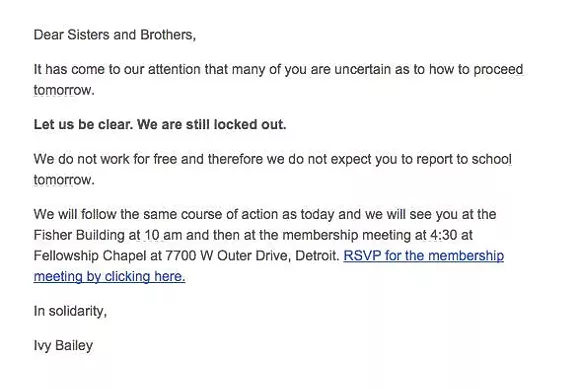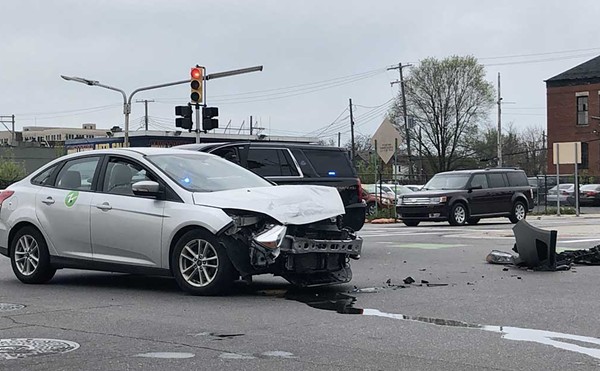Just before 10 p.m. Monday, Detroit Federation of Teachers Interim President Ivy Bailey sent out an email to teachers explaining that day two of the "lock-out" is on.
According to teachers in attendance at a union meeting led by Bailey this past weekend, the term "lock-out" is by design. A sick-out would imply that the teachers were calling-in and using one of their paid sick days. A lock-out, on the other hand, is what happens when teachers are not being paid. The state — which has squandered DPS funds via emergency management (more on that in a bit) — has essentially "locked" the teachers out of teaching.
For a quick recap: All but 3 of Detroit Public Schools' 97 schools were closed Monday as teachers participated in day one of this months' lock-out. The action was in response to news that the $47.8 million that DPS recently received to ensure the district could stay open through June was not being used for teacher payroll. (In April the district's transition manager, retired U.S. Bankruptcy Judge Steven Rhodes, reported the district would be unable to pay staff after April, and Lansing passed a rescue bill in March of nearly $50 million to make sure this wouldn't happen.) The fact that this rescue bill was passed, and yet teacher pay is in jeopardy is puzzling. One of the demands DPS teachers are making is for an audit of the district's finances.
The audit could help clear up where that $47.8 million is going, but also how DPS, which has been under state-control on-and-off (more on) since 1999, has been spending its funds over the last 15-plus years. As the New York Times explains, "The district’s year-end budget deficit ballooned to a projected $320 million this year from $94 million in 2013 — nearly half the total $667 million general fund budget. And that doesn’t count the district’s immense long-term obligations: $3.5 billion in debt, pensions and other costs."
This mushrooming debt, is another reason teachers and advocates for DPS are pushing for an audit.
As State Rep. Sherry Gay-Dagnogo (D-Detroit) said in a statement Monday: "We have learned that the debt of Detroit Public Schools is in excess of $800 million, and it is imperative, now more than ever, that an audit be conducted of DPS from 1999 through the present to find out exactly what happened. While we were unaware of the union’s decision to stage a sickout today, the fear and anger of our teachers is rising, and it will only grow exponentially until something is done about the crisis facing the Detroit Public Schools. There are too many problems that need fixing and questions that need answers which an audit will help to determine the best path forward when it comes to funding as well as ensure there are no gaps in pay or instruction."
While the audit and teacher pay are factors behind this week's empty classrooms, another issue at play is the bigger legislation that Lansing is currently debating relative to the district's future. While many teachers are opposed to both the House and Senates bills — in January a number of DPS teachers traveled to Lansing to protest the legislation — the DFT (which was taken over by the American Federation of Teachers in January) appears to be pushing for the Senate's version of the legislation. In many ways, teachers have been told from both Judge Rhodes and DFT interim president Bailey that supporting the Lansing legislation — which includes a $715 million loan — is the only way to get paid.
AFT President Randi Weingarten tweeted out a link Monday to a petition supporting the Senate bill and, over the weekend, when Bailey reached out to the teachers about the pay issues, she wrote: "... the district will not be able to continue paying employees unless our advocacy to secure the funds through legislation is successful."
The pressure to support the legislation in order to get paid can be confusing, according to Emma Howland-Bolton, a 5th grade DPS teacher at Clippert Elementary School. And this is why the union and its membership appear to agree on staying home in protest of payless paydays and to demand an audit of the district, but differ on whether state lawmakers have the right answers for Detroit's children.
"We need local control like every other district in the state," Howland-Bolton says, pointing out that the senate bill, pushed by the AFT, includes an appointed Detroit Education Commission that would oversee school closings and openings. "I don't want these Lock-Outs to just be about the work this year. We deserve pay for our work this year, but we also want to fix the bigger long term issues."
DFT President: 'Let us be clear. We are still locked out'
[
{
"name": "GPT - Leaderboard - Inline - Content",
"component": "35519556",
"insertPoint": "5th",
"startingPoint": "3",
"requiredCountToDisplay": "3",
"maxInsertions": 100
}
]






